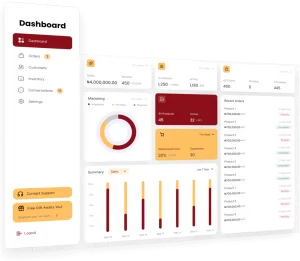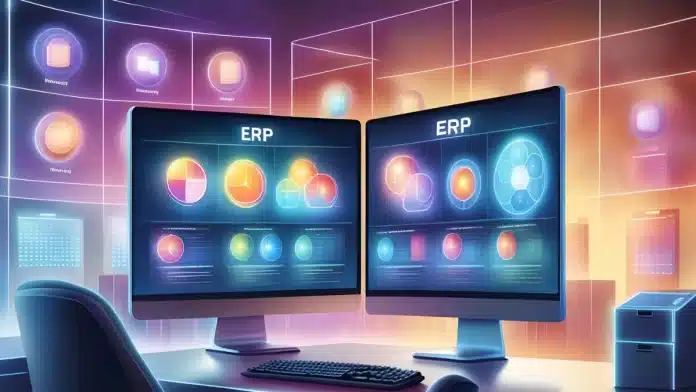In the complex world of manufacturing and business operations, two key systems play a vital role: Manufacturing Execution Systems (MES) and Enterprise Resource Planning (ERP). Both are essential for improving efficiency and streamlining processes, but they serve different purposes within an organization.
MES is focused on managing production on the shop floor, while ERP integrates various business functions into a unified system. Understanding their differences and how they can work together is essential for businesses using technology to drive manufacturing success.
Tatalakayin sa artikulong ito ang mga pangunahing layunin at pagkakaiba ng MES at ERP, ipapakita kung paano sila maaaring pagsamahin para sa mas mataas na kahusayan, at magbibigay ng gabay sa pagpili ng tamang sistema para sa pangangailangan ng iyong negosyo.
Table of Contents

Key Takeaways
|
What is the Manufacturing Execution System (MES)?
Manufacturing Execution System (MES) is a critical technology for the manufacturing sector in the Philippines. It connects and monitors machines and work centers on the factory floor, improving production operations and efficiency.
MES provides real- time data tracking and management, helping manufacturers optimize processes for better performance and profitability. With this system, manufacturers can make informed decisions based on real-time data, resulting in better resource allocation, accurate scheduling, and effective quality control.
By using MES, manufacturers can streamline operations, identify bottlenecks, and improve production output. It enables seamless communication between machines and work centres, ensuring smooth information flow and coordination.
In addition, MES improves plant floor management by providing full visibility into the manufacturing process. Manufacturers can monitor work orders, material usage and produce high-quality products.
What is an Enterprise Resource Planning (ERP) System?
An enterprise resource planning (ERP) system is a strategic tool for managing business processes that unifies all areas of an organization into a single, comprehensive information system.
ERP system are designed to handle resource planning, financial management, and operational supervision, offering a centralized platform for overseeing different parts of a manufacturing business.
By simplifying processes and providing easy access to data, these systems support better decision-making and enhance overall efficiency.
Key Differences Between MES and ERP
To better understand how Manufacturing Execution Systems (MES) and Enterprise Resource Planning (ERP) function within a business, it’s important to highlight their key differences. Below is a table that outlines the main distinctions between MES and ERP systems:
|
Aspect |
MES (Manufacturing Execution System) |
ERP (Enterprise Resource Planning) |
| Primary Focus | Shop floor operations and real-time production management. | Company-wide resource planning and business process integration. |
| Scope | Narrow, focused on manufacturing processes. | Broad, covering multiple business functions (e.g., finance, HR, supply chain). |
| Data Type | Real-time production data (e.g.machine performance, output). | High-level business data (e.g., financial reports, inventory levels). |
| Key Benefits | Optimizes production and enhances efficiency on the factory floor. | Streamlines business processes improves resource allocation. |
| User Base | Primarily production managers and shop floor staff. | Executives, managers, and various department heads. |
| Integration | Can be integrated with ERP for seamless data flow. | Often serves as the core system integrating other business tools. |
This comparison can help businesses decide which system aligns better with their needs or determine if integrating both is the best approach for operational efficiency and growth.
The Harmonious Integration of MES and ERP Systems
The harmonious integration of MES (Manufacturing Execution System) and ERP (Enterprise Resource Planning) systems is essential for modern manufacturing operations that seek to optimize performance and streamline processes.
MES provides real-time data and insights from the production floor, allowing for detailed tracking of manufacturing activities, while ERP encompasses the broader management of business functions such as finance, supply chain, and inventory.
By connecting these two systems, businesses can ensure seamless communication between the factory floor and the corporate level, leading to better coordination, reduced manual effort, and enhanced decision-making capabilities.
This comprehensive integration helps minimize downtime, improve resource allocation, and ultimately boost productivity across the entire organization.
Choosing the Right System for Your Business

When choosing the most suitable system for your manufacturing business, it is essential to consider various key factors. For manufacturers in the Philippines, evaluating operational needs, scalability, and technological readiness is crucial. A thorough assessment of these elements will enable you to make an informed decision that aligns with your business goals and enhances efficiency.
One of the primary aspects to consider is the scale of your operations. Are you managing a small facility or a large industrial plant? The complexity of your processes is another important factor. Some businesses have simpler production workflows, while others require systems capable of handling more complex and detailed processes.
It is also important to understand the specific industry requirements relevant to your business. Different sectors may have unique needs, regulations, and compliance standards, so ensuring that your chosen system meets these criteria is vital for smooth and compliant operations.
Scalability is another critical consideration. You need to confirm that the system can grow with your business, accommodating future expansion and changing operational needs without disruption.
Technological readiness must also be assessed. Ensure that your organization has the infrastructure and resources needed to implement and maintain the system. This includes compatibility with existing IT structures and the technical expertise of your team.
Finally, consider both cost and complexity. Evaluate the total cost of implementation, including initial investment, ongoing expenses, and maintenance. Assess how complex it will be to integrate and use the system within your operations and the potential impact on your workforce and daily processes.
HashMicro offers a transparent pricing scheme that you can access for free. If you are considering HashMicro’s ERP system for your manufacturing company, download the pricing guide by clicking on the banner below to learn more about the required investment.
Implementation Strategies for Manufacturers in the Philippines
In some cases, combining MES (Manufacturing Execution Systems) and ERP (Enterprise Resource Planning) systems may offer the best solution for your business. By integrating these systems, you can take advantage of their unique benefits and adopt a more comprehensive approach to managing your manufacturing operations.
However, implementing MES systems and ERP systems in the Philippines’ manufacturing sector requires careful planning, particularly when it comes to regulatory compliance and market demands. Below are key strategies to consider:
- Ensuring regulatory compliance: Manufacturers in the Philippines must understand and adhere to specific regulations and standards when implementing MES and ERP systems to ensure full compliance.
- Analyzing market demands: Manufacturers must study market trends and needs to align their MES and ERP strategies, facilitating better decision-making and optimized operations.
- Addressing implementation challenges: Integrating MES and ERP systems often presents challenges such as system integration, data transfer, and employee training. Manufacturers must plan ahead to manage these obstacles and ensure a smooth transition effectively.
- Following best practices: Adhering to best practices—such as thorough testing, clear communication, stakeholder involvement, and detailed documentation—is crucial for the successful implementation of MES and ERP systems, ensuring manufacturers can fully benefit from them.
- Leveraging expert guidance: Working with specialized consultants can significantly improve the success of MES and ERP implementation, providing expert advice and insights to ensure optimal system setup and integration.
By taking a structured approach and considering local requirements, manufacturers in the Philippines can effectively implement MES and ERP systems to streamline operations, enhance efficiency, and maintain a competitive edge.
Future Trends in Manufacturing Systems
As the manufacturing sector in the Philippines continues to evolve, several key trends are shaping the future of manufacturing systems. The integration of advanced technologies, such as automation, artificial intelligence, and the Internet of Things (IoT), is transforming the way production processes are managed.
These innovations are enabling manufacturers to enhance efficiency, reduce costs, and improve product quality. Additionally, the increasing focus on sustainability and environmental responsibility is driving the adoption of green manufacturing practices.
With the rise of digital transformation, Philippine manufacturers are also investing in smart factories and data-driven solutions to stay competitive in a global market. As these trends continue to develop, manufacturers in the Philippines must adapt to these changes to remain at the forefront of industry advancements.
Why HashMicro’s ERP System is the Ideal Solution for Manufacturing Companies in the Philippines

In the growing manufacturing sector of the Philippines, choosing between an ERP system and an MES is essential. While both offer valuable benefits, HashMicro’s ERP system stands out as the ideal solution for manufacturing companies seeking a comprehensive, integrated, and future-proof platform. Here’s why:
- End-to-end integration: Our system integrates all business functions, from procurement to finance, enhancing data flow, teamwork, and overall operational efficiency in manufacturing.
- Business intelligence and analytics: HashMicro’s ERP system offers advanced business intelligence tools and analytics, enabling manufacturers to gain valuable insights, identify trends, and make informed decisions to optimize processes and drive continuous improvement.
- Supply chain optimization: Our system streamlines the entire supply chain, from supplier management to distribution planning, reducing costs, shortening lead times, and improving customer satisfaction through timely and high-quality product delivery.
- Financial management and compliance: HashMicro’s ERP system includes comprehensive financial management and compliance tools, ensuring adherence to regulations, financial transparency, and efficient operations in manufacturing finance.
- Scalability and flexibility: Designed with growth in mind, our system offers scalability and flexibility, allowing businesses to expand operations, enter new markets, and introduce new product lines seamlessly, ensuring long-term value from your investment.
With these features and benefits, HashMicro’s best ERP software helps streamline operations, drive growth, and maintain a competitive edge in the Philippines’ rapidly growing manufacturing sector.

Conclusion
While MES systems are effective in managing shop floor operations, HashMicro’s ERP system excels by offering comprehensive integration across all business functions, ensuring seamless data flow and fostering improved collaboration.
The strategic implementation of HashMicro’s ERP not only complies with the regulatory standards and evolving market demands in the Philippines but also supports the scalability required for your company’s growth. By adopting HashMicro’s ERP, Filipino manufacturers can harness powerful analytics, optimize their supply chains, and maintain strong financial governance.
Discover the transformative potential of HashMicro’s ERP system and see how it can accelerate the growth of your business. Take advantage of the opportunity to enhance your manufacturing operations—request a free demo today and experience the significant impact it can deliver.

Frequently Asked Questions About MES vs ERP
-
How do MES and ERP differ?
MES focuses on real-time production and shop floor activities, while ERP oversees broader business processes and resource planning.
-
Which system should a manufacturer choose?
The choice depends on specific business needs—MES is ideal for detailed production management, while ERP covers company-wide operations.
-
Are MES and ERP scalable?
Both systems are scalable and can be tailored to suit the growing needs of a manufacturing business.
{
“@context”: “https://schema.org”,
“@type”: “FAQPage”,
“mainEntity”: [{
“@type”: “Question”,
“name”: “How do MES and ERP differ?”,
“acceptedAnswer”: {
“@type”: “Answer”,
“text”: “MES focuses on real-time production and shop floor activities, while ERP oversees broader business processes and resource planning.”
}
},{
“@type”: “Question”,
“name”: “Which system should a manufacturer choose?”,
“acceptedAnswer”: {
“@type”: “Answer”,
“text”: “The choice depends on specific business needs—MES is ideal for detailed production management, while ERP covers company-wide operations.”
}
},{
“@type”: “Question”,
“name”: “Are MES and ERP scalable?”,
“acceptedAnswer”: {
“@type”: “Answer”,
“text”: “Both systems are scalable and can be tailored to suit the growing needs of a manufacturing business.”
}
}]
}



































